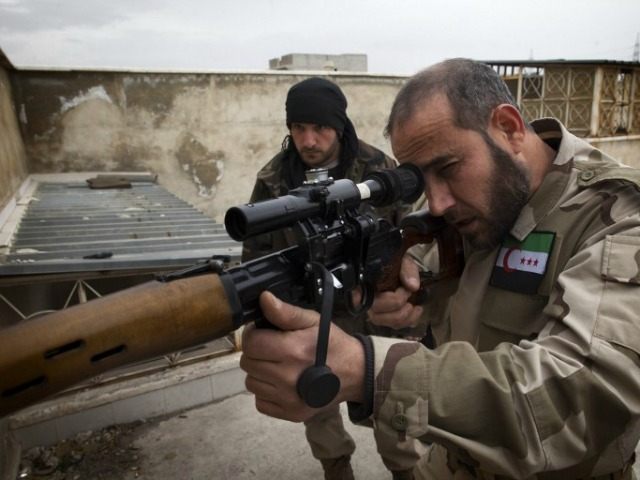Turkmen groups in western Syria, close to the border with Turkey, are working to create an independent militia to combat both the Islamic State (ISIS/ISIL) and any advances made by the Kurdish YPG forces, which have been the only group to enjoy success in keeping ISIS from sweeping through Syria’s border towns.
Turkey’s state Andalou Agency reports that Turkmen leaders are concerned that Kurdish victories in the region will result in their people being forced to move elsewhere, following claims that Kurdish soldiers retaking villages from ISIS in western Syria had forced Arab and Turkmen populations out of their homes. “They forced us from our village and said to us ‘this is Rojava’… ‘Go to the al Badiya desert, go to Tadmur, where you belong,’” said one Arab Tal Abyad villager of the Kurdish forces upon his arrival in the town following the Kurds’ defeat of ISIS. Tadmur is a region currently controlled by the Islamic State; Rojava is the Kurdish name of Syrian Kurdistan.
“Turkmen fighting groups in Syria have taken the decision to offer greater support to each other and work to create a Turkmen army if conditions permit,” Syrian Turkmen Assembly chief Abdel Rahman Mustafa told state media. The military reaction, the Turkmen Assembly claims, is necessary in the face of the “danger of the YPG and the acts of sectarian cleansing it is carrying out, beginning with the expulsion of 200 Turkmen settlements in [the] Tel Abyad [area].” This third militia would presumably also work against the Islamic State.
Turkmen groups have protested the presence of Kurdish forces in Syrian and Iraqi Kurdistan before, claiming that the Kurds were more concerned with establishing an independent state than protecting civilians from ISIS. “Tel Abyad is a Turkmen region in Syria. First, ISIL was placed here. Turkmens were forced to live under ISIL. Then, using ISIL as a pretext, these places are being handed over to Kurds, with Turkmens being forced out of their homeland,” Ershad Salihi, a leading figure of the Iraqi Turkmen Front (ITF), claimed last month in the Turkish newspaper Hurriyet.
Interviews with Kurdish leaders have made indisputably clear that multiple Kurdish groups seek to establish an independent Kurdistan. What is not so clear is whether these groups would work with each other. “They have only one goal, whether the U.S. likes it or not,” a source close to the YPG told Fox News last week, adding that, in Iraq, “They are pushing hard in Kirkuk to hold Kirkuk and keep ISIS out and once that is done, they will move forward with plans for their country.” Masrour Barzani, head of Iraq’s Kurdistan Regional Government (KRG) intelligence forces and son of KRG President Masoud Barzani, made this clear in an interview with Al Monitor recently, as well, though he also sternly confirmed that the elder Barzani did not see a role for the Kurdistan Workers’ Party (PKK) to play in the formation of Kurdistan. The PKK is a Marxist terrorist group with ties to the YPG, widely considered the paramount enemy of the Turkish government under President Recep Tayyip Erdogan.
The expansion of the YPG has led Turkish officials to arrive at similar conclusions to that of Syrian Turkmen seeking to form a militia: that the PKK will be strengthened by the YPG’s advances against the Islamic State. The Turkish government is reportedly so worried about the Kurds that they are considering military intervention in Syria– not against ISIS, but against the YPG.
The YPG, with the backing of the United States, has indisputably led the most successful military efforts against the Islamic State in Syria. As The Jerusalem Post explains, “The Kurds control a long contiguous stretch of the Syria-Turkey border” that could have fallen to ISIS and become an open door for foreigners attempting to join the jihad against the West. The newspaper notes that the PKK has already threatened Turkey should they attempt an intervention in Syria.
In addition to keeping the border between Turkey and Syria existent and out of the hands of the Islamic State, the Kurdish forces there have recaptured ten villages from ISIS north of Raqqa, the “capital” of the Islamic State jihadist group, coming the closest of any ground troops to entering Raqqa. An Islamic State defeat in Raqqa would be an unprecedented coup against the terror organization.

COMMENTS
Please let us know if you're having issues with commenting.